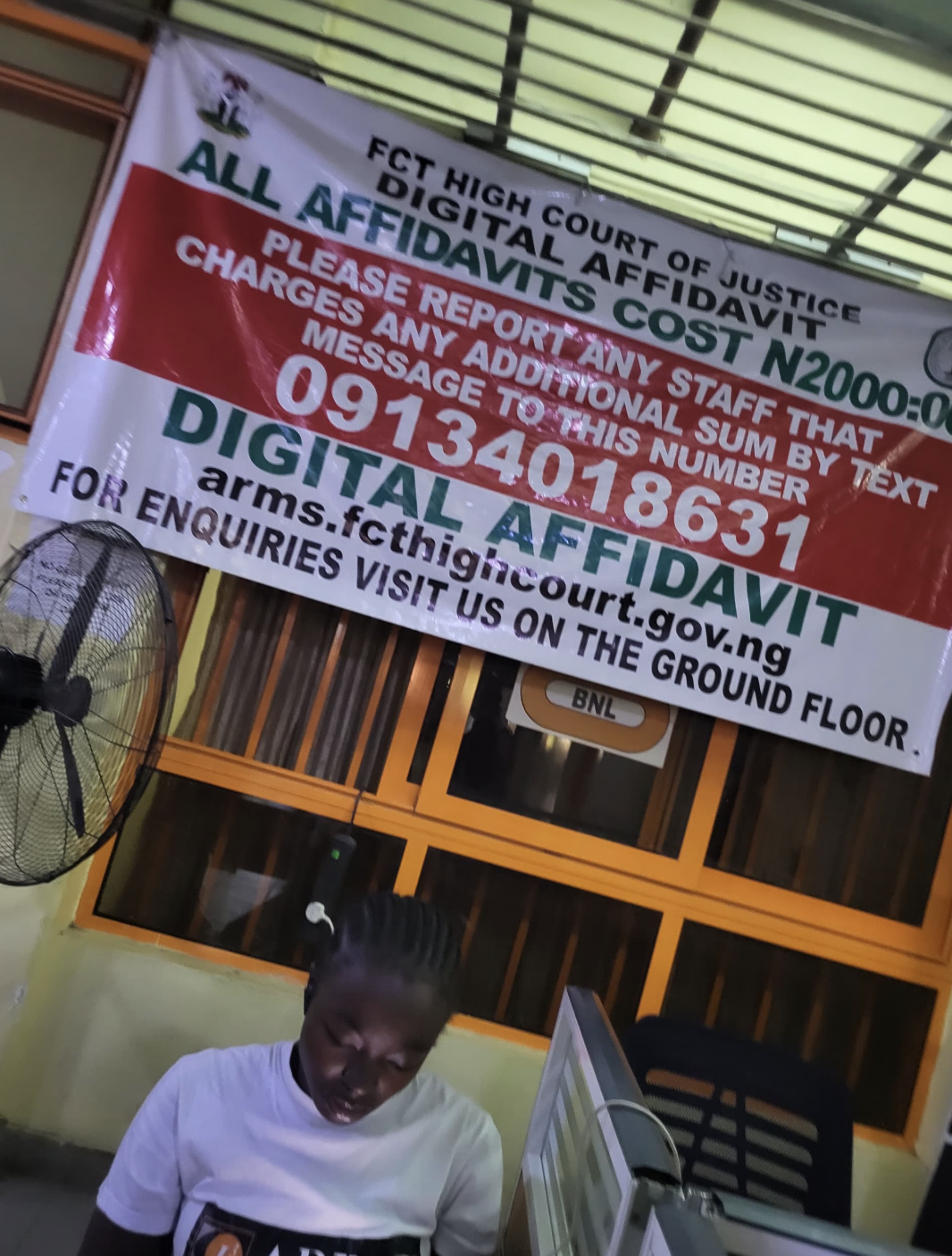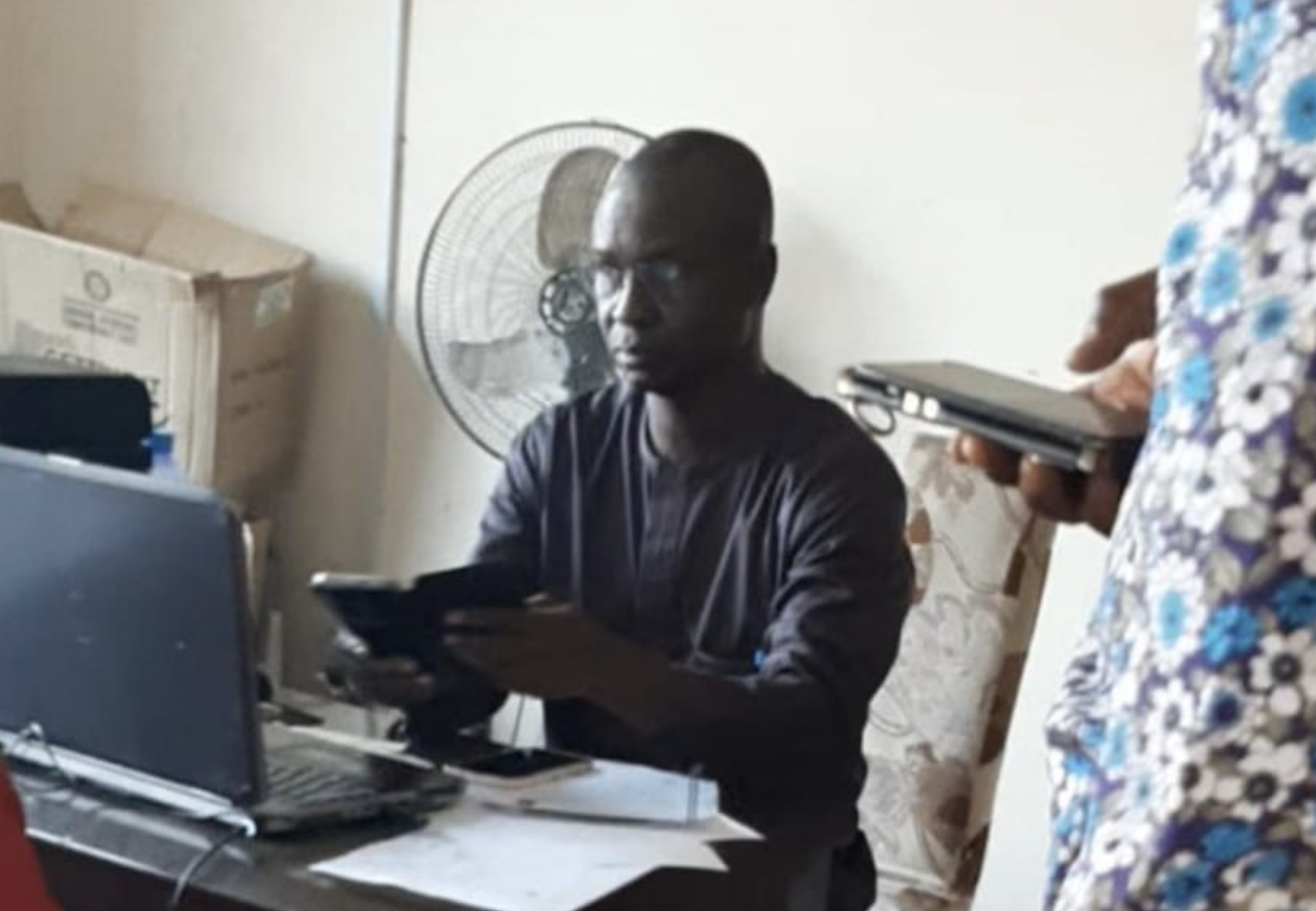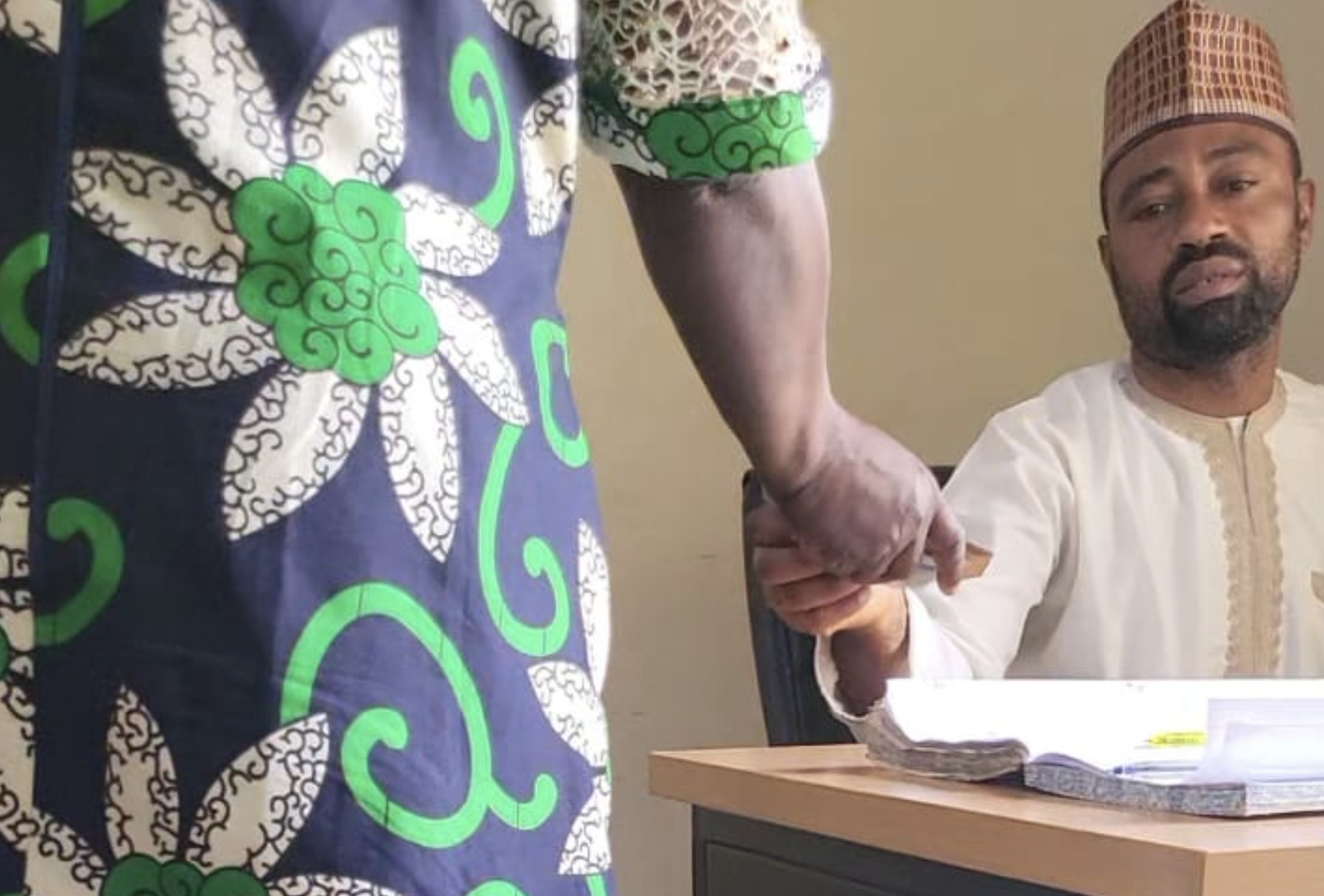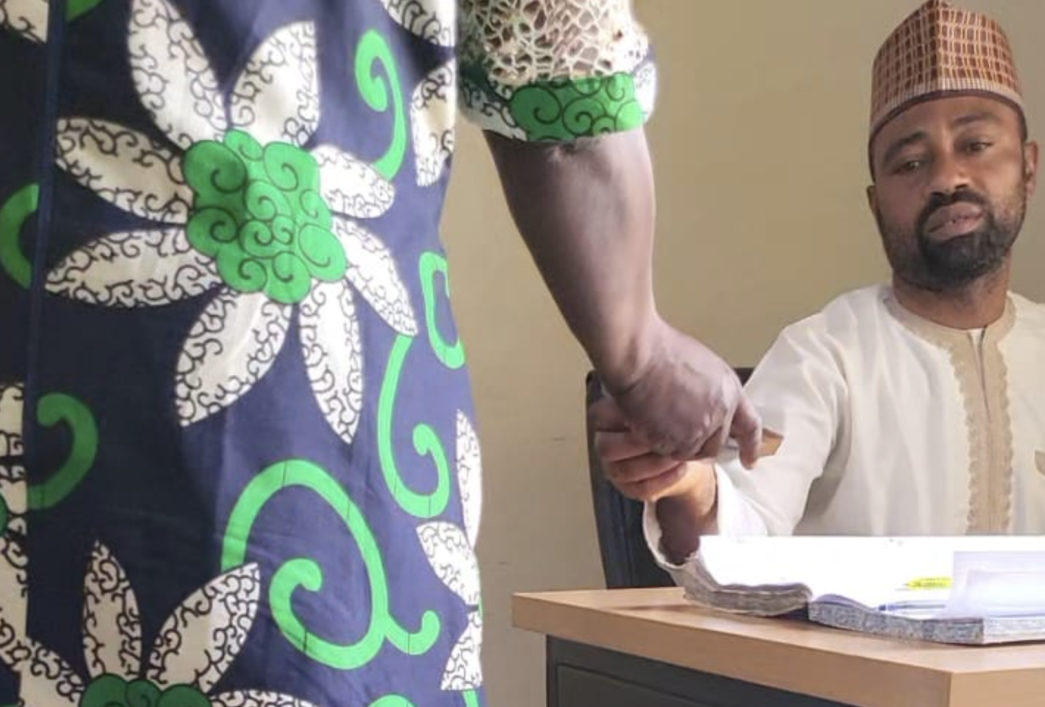Commissioner of oath, FCT high court Lugbe receiving N3,000 from a deponent
From the comfort of his office in Abuja, Igho Ogedegbe, a lawyer, successfully applied for an affidavit of loss of phone/SIM pack online — a significant improvement over the cumbersome manual process he had endured earlier in his legal career.
While he appreciated the convenience, the requirement to visit the court to finalise the process left him disappointed. It seemed to undermine the system’s time-saving promise.
“Obtaining the affidavit from the court was not only a waste of my time but also incurred additional expenses. This inconvenience could have been avoided if I had been able to access a soft copy of the affidavit online,” the lawyer said.
An affidavit is a sworn statement in writing, made under oath or affirmation before an authorised legal officer, used in court proceedings or for other official purposes. Historically, the process of obtaining an affidavit has been fraught with challenges, including delays, extortion, and even impersonation of commissioners for oaths.
Advertisement
To address these issues, the federal capital territory (FCT) high court introduced the Affidavit Registry Management System (ARMS) in 2022. The initiative aimed to make affidavit applications more accessible and efficient within the FCT.
According to the 2023 updated practice direction on e-affidavit, issued by Husseini Yusuf, chief judge of the FCT high court, the system was established to ensure “transparency, efficiency, and speed in the issuance of affidavits, in compliance with global best practices”. It also sought to “protect litigants and court users from touts and fraudsters, and reduce delays and expenses”.
HOW IT WORKS
Advertisement
The e-affidavit system is designed for simplicity. You create an account and input your personal details. You will need a passport photograph for upload. Then you choose the type of affidavit you need from the drop-down menu and select your preferred judicial circuit or location. You’ll pay a fee of N2,180 online to proceed. A template is generated for you to customise with your details. After editing and reviewing, submit the application for approval.
Despite its streamlined steps, the process still requires deponents to appear in court for signing and printing, defeating the system’s goal of saving time and cost.
LOW AWARENESS AND DIGITAL LITERACY HINDERING ADOPTION
To assess public awareness of the e-affidavit system, this reporter visited the FCT high court in Maitama. Despite prominent banners advertising the service, many deponents were unaware they could complete the process online.
Advertisement

“It was only when I got here that I saw the ARMS banners and links,” said Rose Gideon, a deponent applying for a correction of name.
When this reporter attempted to request an affidavit manually, the fee charged was N2,050, but no official receipt was issued — a subtle indication of the system’s persisting loopholes.
EXTORTION BY COURT OFFICIALS
For some users, like 37-year-old Serah Luke, a lack of familiarity with the system left her vulnerable to exploitation.
Advertisement
Luke, a cleaner and mother of three, had struggled for seven years to access her Polaris Bank account due to discrepancies in her identification documents. Determined to fix the issue before the festive season, she visited the court in Maitama to apply for an affidavit of reconciliation of name.
“I missed out on a lot of good things and monetary gifts because I could not use my account,” Luke said in a blend of English and Nigerian Pidgin.
Advertisement
Unfamiliar with the process, she was approached by a court official at the gate who offered to help for a fee of N5,000.
“Immediately I got to the gate, a man, who I think is a security guard, asked me some questions. Then he said I should bring N5,000, which I gave him in cash. He snapped my national ID card, collected my passport photo, and went inside, leaving me at the car park,” she explained.
Advertisement

Although she owned a smartphone, it was a recent gift from a client after her old phone malfunctioned. Her limited digital literacy left her unable to navigate the online system on her own.
At the FCT high court in Kubwa, a staff member seated at the court’s entrance informed this reporter that processing an affidavit would cost ₦3,000. However, the staff added, “There’s no light here. Go to the other court at FO1, near Living Faith Church. They’ll attend to you there.”
Advertisement
Following the suggestion, this reporter proceeded to the magistrate court in Dutse. Upon arrival, a number was issued, and I joined a queue of deponents. Many appeared visibly frustrated, some lamenting that they had been waiting for over three hours.
After waiting for more than an hour, one of the three staff members handling affidavits called four deponents into his office. Unlike officials at the other courts, this staff member took the time to guide deponents through the process of creating accounts on the e-affidavit portal. However, he did not provide guidance on how to complete the payment.
When it was time for payment, the staff member collected the deponents’ phones and handed them to Salihu Nurudeen, a middle-aged man assisting with affidavit processing. Observing from behind him, this reporter confirmed that Nurudeen made an online payment of ₦2,190 (including transfer charges) for my affidavit. However, we were charged ₦3,000.

At the FCT high court in Bwari, Emmanuel Peter, a videographer, said although he was asked to return the next day, he was told processing an affidavit for correction of name would cost N3,000.
“One man I met there said they told him ‘booklet’ finished and that they were going to get more booklet,” Peter narrated.
“But when I approached a staff of the court to ask if I could still get the affidavit that day, he said I should come back the next day.
“I asked him how much, and he said he’d do it for N3,000.”
Eventually, Peter was directed to the customary court of appeal after pleading that he needed an affidavit urgently to enable him to access his bank account. There, his affidavit was handwritten, and he was charged ₦3,000.
To test the efficiency of the e-affidavit system, this reporter applied online for a correction of name affidavit on January 6, selecting FCT high court Lugbe as the preferred judicial circuit. Eight days later, the application was still pending approval.
On January 14, this reporter visited the court to complete the process. After waiting her turn in the office of the commissioner of oath, this reporter explained to a lady helping to process affidavits that she had started the process online but it was still pending approval.
“How can there be approval when you did not come to see the commissioner of oath? Did you make payment online too?” she asked brashly.
When I answered affirmatively, I was asked to wait for the commissioner of oaths. Upon his return, he expressed clear displeasure at the online initiation of the process.
“It doesn’t mean that because it is online, you should do it online. You just want to give me problems. Come to the court. Is this how it is supposed to be?” the visibly irate commissioner said, criticising my approach.
 Commissioner of oath at the FCT high court Lugbe receiving N3,000 from a deponent
Commissioner of oath at the FCT high court Lugbe receiving N3,000 from a deponent
After making the necessary corrections, he dismissed me from his office with a sharp flick of his hand.
While I wasn’t asked to pay any extra fees, other deponents in the same office were charged ₦3,000 each to process their affidavits.
ADDRESSING CHALLENGES
In light of growing concerns, this reporter visited the court premises and wrote an official letter to the chief registrar of the FCT high court seeking clarification on the issues raised by users of the system. In response, a three-member panel was set up to interface with this reporter.
The panel comprised Yusuf Babawo Mohammed, deputy chief registrar of the FCT high court; Lawal Funmilola Bosede, director and head of commissioners for oath department; and Bede Okolie, a staff of the Judicial Research and Reform Centre of the FCT high court
The panel noted that the court has taken stringent measures to curb the menace of extortion.
According to Mohammed, some staff members indicted for extortion have been sacked, while others have been demoted.
“Anybody who collects more than this amount is doing a criminal activity that the court is not aware of. Once the court is aware of such activity, it punishes it,” he said.
“Even those who were not our staff but involved in the activity, we arrest them and hand them over to the police. We will eventually take them to the court.”
He encouraged deponents to read the banners placed at strategic parts of the court for guidance and to call the attached numbers if they encounter extortion.
Furthermore, the panel noted that the court’s management is looking to strengthen supervision of court divisions located outside the metropolis to monitor compliance as well as improve the orientation of both staff and deponents.
Addressing the issue of physical appearance in court after initiating the e-affidavit process, Okolie clarified that the practice directions of the court and the Evidence Act require a deponent to physically appear before the commissioner of oath to depose to their affidavit.
However, Mohammed revealed that plans are underway to fully digitise the affidavit process.
“As a matter of fact, the consultants have already fine-tuned the virtual affidavit system in a way that just like in the case of the federal high court mentioned, you can initiate your affidavit,” he said.
The system includes a feature that allows a deponent to schedule a video call virtually with the commissioner of oath. Mohammed noted that while this feature has been tested, the court is still working on the legal framework to accommodate the process.
“So, there is a feature there where you can see the commissioner for oath,” he said. “But we are still trying to fine-tune the legal aspect of it. In fact, it has been tested.”
Recognising the challenges faced by a significant number of Nigerians who lack digital literacy or access to basic tools like phones or bank accounts, Mohammed emphasised the need for the system to accommodate this demographic.
“Some people actually come for this activity not even having a phone, a bank account, or ATM cards. So, the system must be a little relaxed to accommodate this group. Otherwise, you’ll be digging them out,” he said.
When evidence, including videos and photos, was presented to the panel, Lawal, who headed the panel, promised that action would be taken against those indicted.
This report is produced under the DPI Africa Journalism Fellowship Programme of the Media Foundation for West Africa and Co-Develop.
Add a comment









